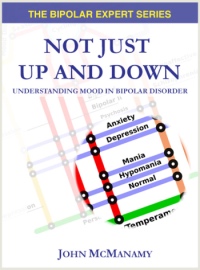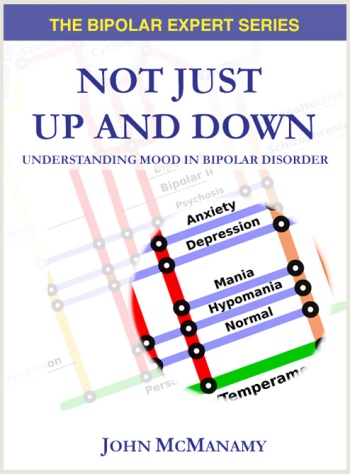More on Natural Remedies
 |
Your brain can't function without nutrients, but what else do we know?
|
Supplements and natural remedies for depression and bipolar. Says Hippocrates:
Leave your drugs in the chemist's pot if you can heal the patient with food.
In a study published in the July 2002 British Journal of Psychiatry, 172 young adult prisoners in maximum security were given supplements of vitamins and minerals roughly equating to the US recommended daily allowance (RDA), plus fatty acids. The average time for those staying in the study was 146 days. While there was no change in the placebo group, there was a 35 percent drop in antisocial behavior for those taking supplements for at least two weeks and a 37 percent drop in violent offenses.
Nutrients as Brain Food
Speaking at a symposium, "Mineral/Vitamin Modification of Mental Disorders and Brain Function" at the 2003 American Psychiatric Association's annual meeting, the study's lead author, Bernard Gesch of Oxford, noted that crime has increased seven-fold in the last 50 years. Over the same period of time, he reported, the trace element content in fruits and vegetables appears to have fallen significantly. According to the Centers for Disease Control, 79 percent of high school students eat less than five fruits or vegetables a day, and it is estimated that the ratio of omega-6 to omega-3 intake has increased six-fold since Paleolithic times.
My New Book!

Purchase now.
The RDA was never meant to be regarded as optimal, more than one speaker reminded those at the same symposium. Instead, it is the minimum considered to prevent diseases such as scurvy or beriberi. According to a review article by Fairfield and Fletcher published in the June 19, 2002 JAMA, "most people do not consume an optimal amount of all vitamins by diet alone."
At the same session, David Benton of the University of Wales, Swansea, related that the brain is arguably the most nutritionally sensitive organ in the body. It is the most metabolically active organ, with two percent of the body's mass accounting for 20 percent of basal metabolic rate. With millions of chemical processes taking place, he went on to say, if each of these is only a few percent below par, it is easy to imagine some sort of cumulative effect resulting in less than optimal functioning.
A quick search through PubMed reveals a good deal of the research involving supplements and mental health concentrates on aging populations. Here, a strong case can be made for various nutrients maintaining brain function and slowing down the type of degeneration that leads to dementia, depression, and other conditions. This is a different proposition than taking a specific nutrient to treat a specific condition, though this may not be a bad idea in certain instances, either.
What we know is that certain nutrients in particular have been linked to brain function, including folate (cell maintenance), vitamins B6 and B12 (synthesis of neurotransmitters), vitamin D (vitamin D receptors have been mapped in the brain), vitamins C and E (protecting against free radical oxidative stress), omega-3, amino acids, and various trace minerals (including iron, zinc, manganese, magnesium, copper, and others involved in a host of metabolic processes).
Likewise we know that nutrient deficiencies have been linked to just about everything that can go wrong in the brain, from neuro-degenerative illnesses such as dementia to impaired memory and cognitive function to fatigue to depression to antisocial behavior to stress and anxiety to mood swings.
What we don't know is the impact a particular nutrient (or combination of) will have on any condition. The research is promising, but psychiatry still believes that vitamins are things associated with the Flintstones. The session I walked into at the 2003 APA was the only one of its type I am aware of in the eight APAs (involving six solid days and evenings of seminars, lectures, workshops, and symposia) I have attended from 2002 to 2009.
By the same token, beware of any alternative practitioner overselling their treatments, typically along the lines of their "vitamin X" as the next serotonin. Of all things, despite their claims as "alternative," the entire industry talks essentially the same game as Pharma, replete with the same "chemical imbalance" myth.
Okay, two case studies representing two entirely different approaches, then you're on your own ...
Methylation and All That Jazz
According to William Walsh, founder of the Pfeiffer Treatment Center outside Chicago, depression and bipolar "are a diverse collection of disorders, each with a different biochemistry."
Treatments at the Pfeiffer Center are derivative of orthomolecular medicine, popularized by Linus Pauling.
Of particular interest to Dr Walsh is methylation, essential to more than a hundred processes in the body, from the brain to the bones. Under-methylation, he says, is characterized, among other things, by low levels of serotonin, dopamine, and norepinephrine. Under-methylated bipolar patients exhibit a range of characteristics from seasonal allergies, high libido, and sparse body hair to anxiety. Under-methylated depression patients share many of the same tendencies.
According to Dr Walsh, under-methylated patients usually respond well to methionine, SAM-e, calcium, magnesium, omega-3,, B-6, inositol, and vitamins A, C, and E, but should avoid supplements containing folic acid.
Over-methylation, by contrast, is the biochemical opposite (eg high serotonin), with bipolar patients tending to experience a host of chemical or food sensitivities, high anxiety, low libido, tendency for paranoia, heavy body hair, hyperactivity, and grandiosity. Over-methylated depressed patients are prone to paranoia and despair.
These patients, says Dr Walsh, usually respond well to folic acid, B-12, niacinamide, DMAE, choline, manganese, zinc, omega-3 essential oils (DHA and EPA) and vitamins C and E, but should avoid supplements of methionine, SAM-e, inositol, TMG and DMG.
Then there is genetic pyrrole disorder, or pyroluria, characterized by a sensitivity to stress. Pyrroles bind with vitamin B6 and then with zinc, thus depleting these nutrients. According to Dr Walsh, pyroluric individuals cannot efficiently create serotonin since B6 is an important factor in the last step of its synthesis. They usually respond quickly to supplements of zinc, B-6, Primrose Oil, and augmenting nutrients.
At the 2003 Non-Pharmaceutical Approaches to Mental Disorders conference sponsored by Safe Harbor, Dr Walsh cited an outcome study of 200 depressed patients treated at the Pfeiffer Center in which 60 percent reported major improvement and 25 percent minor improvement. He concluded his talk with Pfeiffer's Law, namely: For every psychiatric medication that helps a patient, there is a natural substance that can produce the same result.
The EMPower Controversy
In 2000, I happened to come across an item in a Canadian newspaper about an Alberta Company, Synergy of Canada Ltd (Truehope is their marketing arm), that was test marketing a mix of 36 supplements at about 10 times RDA, called EMPower, based on a formula to calm aggressive hogs.
Founder Anthony Stephan's story is compelling, how after his bipolar wife Deborah committed suicide in 1994, and how after exhausting all medical routes, he turned to friend David Hardy for help for two of his bipolar children. David came up with a variation on his formula he used for calming down hogs, and Anthony successfully administered the supplement to his kids.
If reading this brings out the cynic in you, there is an excellent 2009 post by Jane on her blog Mental Health Recovery - entitled Truehope or Truehype? - which attacks the founders' claim of a blend of nutrients specially formulated "in a balance designed specifically for people with mental illnesses."
To Jane, this reeks of "The Colonel's secret recipe." Her review of EMPower's ingredients and their doses in fact reveals very little difference from multivitamins such as GNC and Centrum.
Not surprisingly, Health Canada tried to shut down Truehope while various quack watch groups made the company its great white whale. But something funny happened at the end of 2001: The December Journal of Clinical Psychiatry of that year published a small pilot study by Bonnie Kaplan of the University of Calgary, plus an accompanying commentary by Charles Popper of Harvard.
In an open trial, Dr Kaplan placed 14 bipolar patients on EMPower, concurrent with their meds. After 44 weeks, depression scores dropped by 55 percent and mania scores by 66 percent. Most patients were able to lower their meds doses by 50 percent. Two were able to replace their meds with the supplement. Three dropped out after three weeks. The only side effect was nausea, which went away at a lower dose.
In her article, Dr Kaplan speculates that bipolar may be an error of metabolism, or those with bipolar may be vulnerable to nutrient deficiencies in the food supply.
In his accompanying commentary, Dr Popper mentioned using the supplement to treat 22 bipolar patients, 19 who showed a positive response, 11 who remained stable for nine months without drugs.
Then Health Canada came down like two tons of bricks on Truehope and the studies dried up. Truehope fought back. In 2006 a court decided in Truehope's favor, and a new stream of small studies authored by Dr Kaplan is now appearing in journals.
Caveat Emptor
Be smart. Live well ...
See also: Supplements, SAM-e and St John's Wort, and Omega-3
This replaces an earlier article, Feb 2, 2011
 |
More articles on treatment. |




